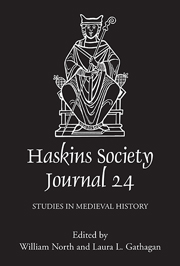Book contents
- Frontmatter
- Contents
- List of Figures
- Editor's Note
- Abbreviations
- 1 ‘Those Five Knights which you Owe me in Respect of your Abbacy’. Organizing Military Service after the Norman Conquest: Evesham and Beyond
- 2 Voluntary Ascetic Flagellation: From Local to Learned Traditions
- 3 The Material and the Visual: Objects and Memories in the Historia ecclesiastica of Orderic Vitalis
- 4 Anonymus Vaticanus: Another Source for the Normans in the South?
- 5 Christian Community and the Crusades: Religious and Social Practices in the De expugnatione Lyxbonensi
- 6 Godric of Finchale's Canora Modulatio: The Auditory and Visionary Worlds of a Twelfth-Century Hermit
- 7 Did Portugal Have a Twelfth-Century Renaissance?
- 8 Internal and External Audiences: Reflections on the Anglo-Saxon Archive of Bury St Edmunds Abbey in Suffolk
4 - Anonymus Vaticanus: Another Source for the Normans in the South?
Published online by Cambridge University Press: 05 December 2013
- Frontmatter
- Contents
- List of Figures
- Editor's Note
- Abbreviations
- 1 ‘Those Five Knights which you Owe me in Respect of your Abbacy’. Organizing Military Service after the Norman Conquest: Evesham and Beyond
- 2 Voluntary Ascetic Flagellation: From Local to Learned Traditions
- 3 The Material and the Visual: Objects and Memories in the Historia ecclesiastica of Orderic Vitalis
- 4 Anonymus Vaticanus: Another Source for the Normans in the South?
- 5 Christian Community and the Crusades: Religious and Social Practices in the De expugnatione Lyxbonensi
- 6 Godric of Finchale's Canora Modulatio: The Auditory and Visionary Worlds of a Twelfth-Century Hermit
- 7 Did Portugal Have a Twelfth-Century Renaissance?
- 8 Internal and External Audiences: Reflections on the Anglo-Saxon Archive of Bury St Edmunds Abbey in Suffolk
Summary
Contained in two manuscripts preserved in the Biblioteca Apostolica Vaticana is a little-known chronicle by an anonymous writer of the mid-twelfth century which may shed more light on an epoch-making event on the eve of the Crusades: the Norman conquest of Sicily. This source, collated into a single transcription by Giambattista Caruso in 1723 and reproduced in the Rerum Italicarum Scriptores by Ludovico Muratori in 1726, is called the Historia Sicula a Normannis ad Petrum Aragonensem by Anonymus Vaticanus. Despite the fact that it is one of a very few sources to describe a seminal episode in Mediterranean history, the Historia Sicula has not been discussed in any depth for over a century. This essay seeks to correct that oversight.
In his formative work, Mohammed and Charlemagne, the great Belgian historian Henri Pirenne contended that ‘the rapid and unexpected advance of Islam’ had precipitated ‘the end of Mediterranean unity’ by vanquishing the mare nostrum of ancient Rome. The resultant loss of Sicily to the Aghlabids of North Africa in the ninth century established what maritime historian A.R. Lewis termed ‘the Islamic Imperium’ and inspired the fourteenth-century Arab scholar Ibn Khaldūn to claim that ‘the Muslims had gained control over the whole of the Mediterranean’. At the beginning of the eleventh century, the Mediterranean was, in effect, a Muslim lake with most of its major islands, including Sicily, firmly ensconced in Dar al-Islam (the ‘House of Islam’).
- Type
- Chapter
- Information
- The Haskins Society Journal 242012 Studies in Medieval History, pp. 79 - 94Publisher: Boydell & BrewerPrint publication year: 2013

